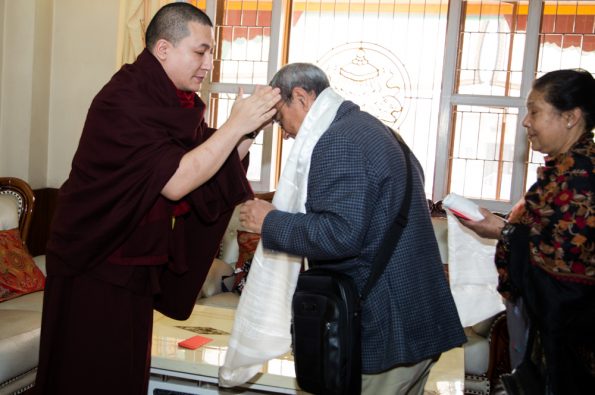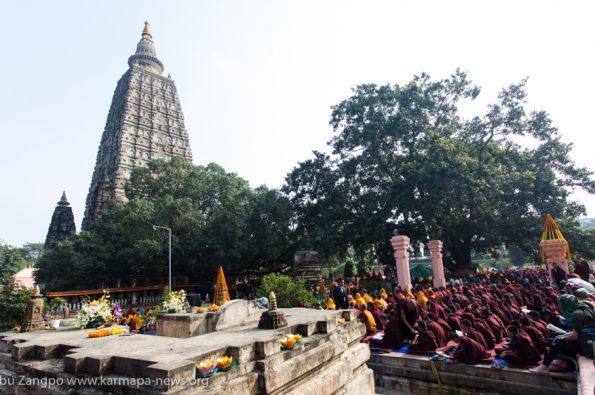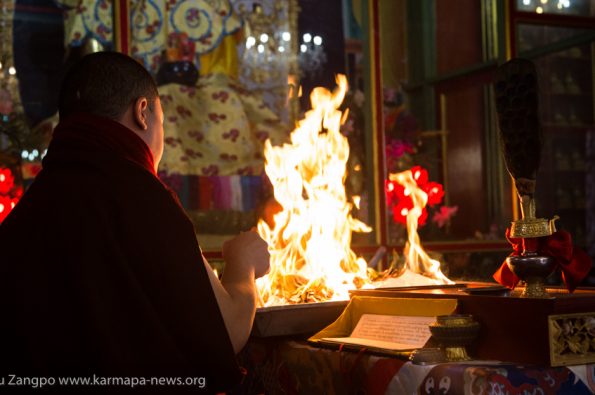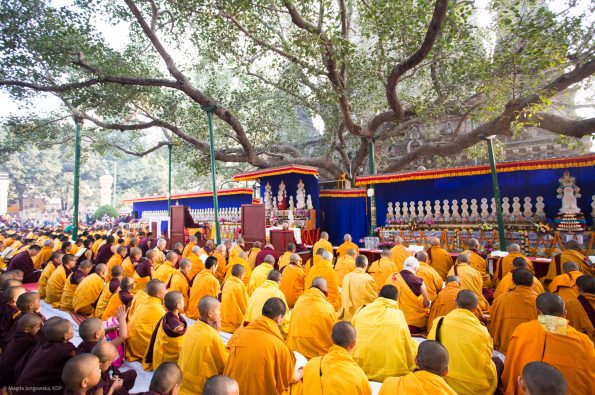Gyalwa Karmapa gave teachings and empowerments in KIBI, New Delhi
Gyalwa Karmapa gave teachings and empowerments in KIBI, New Delhi
As the highlight and conclusion of this year’s program of study, the 17th Gyalwa Karmapa Trinley Thaye Dorje offered teachings and initiations at the Karmapa International Buddhist Institute (KIBI) in New Delhi. Two hundred devotees from all over the world gathered at the Institute to meet with His Holiness and hear him speak about the path of the Bodhisattva.The intense and genuine spiritual atmosphere during the course left a deep impression on everyone who was present.
Within a few days disciples of the Gyalwa Karmapa from 20 different nations poured into the Karmapa International Buddhist Institute (KIBI). Dormitories had to be setup to accommodate the large groups arriving at the institute. The beautiful red building with its many hallways and courtyards vibrated with life, and the large dining hall echoed with the cheerful conversations of many different tongues.
H.H. Gyalwa Karmapa teaching
One hundred and sixty visitors travelled to KIBI to join the forty students of the institute at the closing ceremonies presided over by His Holiness the 17th Gyalwa Kamapa Trinley Thaye Dorje. Like the previous year, the Karmapa conducted a week long course, consisting of four days of intensive teachings and a series of initiations. The program began in the afternoon of March 14th with a Manjushri empowerment. In the subsequent days, the Karmapa conducted two additional empowerments: the Medicine Buddha on the 17th and the Vajrasattva (Dorje Sempa) on the 20th. With the latter the program officially came to a close.
At the centre of the teachings given by the Gyalwa Karmapa stood the “37 practices of a Bodhisattva”. This beautiful text written by Ngulchu Thogme Sangpo contains the essence of a Bodhisattva’s way of life.His Holiness, who first studied this profound text at the age of twelve and authored a commentary to it at this time, stressed the importance of these instructions as guidance for every Buddhist practitioner.On the afternoons of the 15th and 16th, and then the 18th and 19th, the Gyalwa Karmapa gave detailed explanations of each verse, teaching in both Tibetan and English (see English translation of the 37 practices of a Bodhisattva here).
Both before and during the course visitors had the opportunity to meet with His Holiness privately or in groups, and he took the time to answer everyone’s questions. In addition, the Karmapa conducted a long audience for the 40 students who attended classes this year at KIBI studying Buddhist philosophy with Khenpo Tsering Samdrup.
Prof. Sempa Dorje
In the evenings Prof. Sempa Dorje offered a set of basic Buddhist teachings, emphasising the need to apply the Dharma teachings to one’s everyday life. He devoted much time to answering the many questions that arose during the course. Prof. Sempa Dorje will be present during next term at KIBI to instruct 3rd year students in Buddhist Theory of Perception (tsema). The lively evenings with the Professor made clear that they have much to look forward to. His teachings were translated by Khenpo Tsering Samdrup, who, in addition to his ongoing classes for KIBI students on Madhyamaka philosophy, taught every morning on Jamgon Mipham Rinpoche’s presentation of the Four Noble Truths in the “Gateway to Knowledge.”
On the request of Maggy Lehnert and her group, Sopenla Tsultrim Namgyal, the attendant of both the 16th and the present 17th Gyalwa Karmapa, told the life story of His Holiness the 16th Karmapa Rangjung Rigpe Dorje. Everyone interested was invited to join the group of listeners around Sopenla in the assembly hall every day before lunch.
On Saturday 21st the KIBI invited everyone to have lunch with His Holiness, who bid all the students and guests farewell. While everyone left with their own very personal impressions of what they experienced during the course, there was an overall feeling of gratitude and inspiration that left no one untouched.
Report: Eva Ottmer
Photos: Thule G. Jug (46), Dorte (2)




